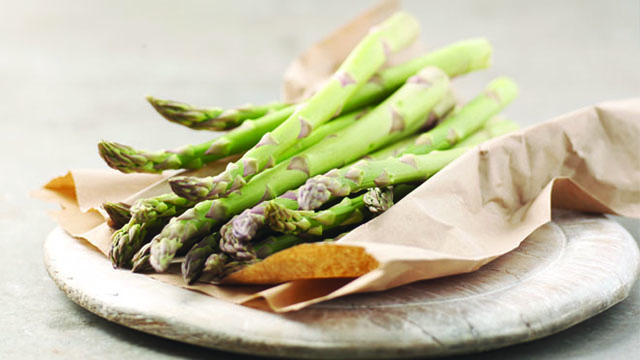Formby Asparagus In Season Now
Written on June 14th, 2013

With its crisp snap and sweet, grassy flavour, asparagus is rightly regarded as one of early summer’s greatest treats. The British season officially begins on May 1st, and the Formby crop, grown by Andrew Molyneux in one of the North West’s traditional asparagus areas, is in season now.
Available for around ten weeks a year, Formby asparagus is a fleeting pleasure. But what makes it special? “I think Formby asparagus is the best tasting; the flavour’s a lot sweeter,” says Andrew, proudly. Much like a French winemaker, he credits terroir; here it’s the light, sandy Formby fields, which are not far from the sea. “It’s the combination of the climate, soil type and water availability,” he says. “There’s a very high water table so we don’t have to irrigate, and it’s virtually pure sand, which asparagus loves. There are very few places where it’s growing on pure sand.”
Cultivating asparagus here makes perfect sense, though it’s not easy. “Originally it was wild in the sand dunes – you can walk over the dunes and find it growing among the pine trees – and as technology developed in the late 1800s, it was commercially planted in the Formby area. It grew from there, although now smaller growers have got out if it, and there’s probably no more than 30 acres.”
Just as heavy handling in the kitchen can kill the sappy green flavour of fresh-cut asparagus, this delicate crop must be harvested carefully in the fields. “The crown keeps sending up spears throughout the growing season,” says Andrew, “and if you damage one that’s below the ground while you’re cutting, it just doesn’t grow.”
Because asparagus doesn’t hang around, we make sure it gets from field to store as quickly as possible. Fresh like this, it doesn’t even need cooking. “It’s quite a versatile vegetable, and I like it raw in salads,” says Andrew. “It just needs a just a quick wash.” If you do decide to apply heat, don’t worry about needing an asparagus kettle; a few minutes in boiling water, or a conventional steamer, will preserve its colour and flavour just as well as the specialist kit.
Cooked so it’s just tender, it’s lovely with butter or hollandaise, but it takes on a more intense flavour in the heat of the griddle. Caramelise it with a bit of garlic for a lovely starter, or use roasted spears in a home-made asparagus tart. It’s the kind of portable treat that could be eaten anywhere, but in the circumstances Formby beach might have a special appeal.
